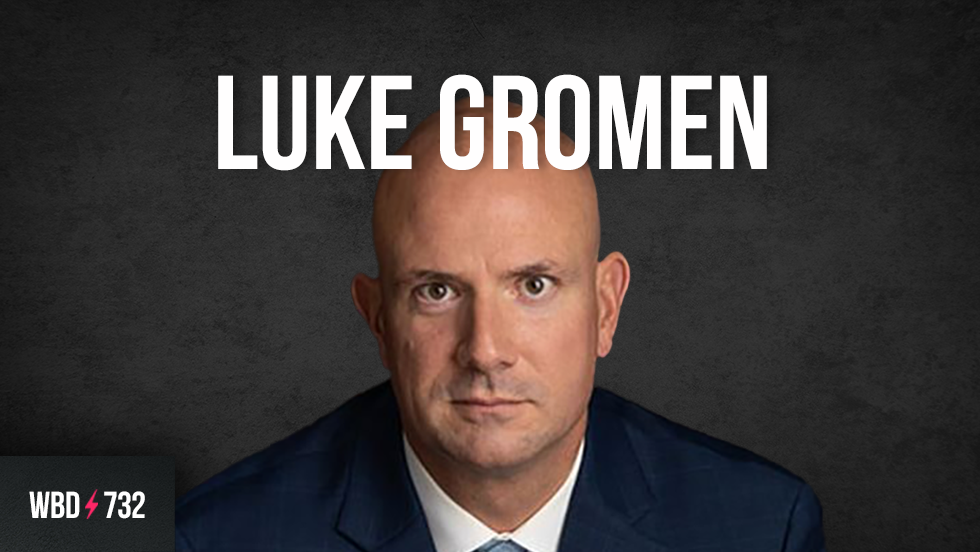Bitcoin vs the Infinite Money Printer with Luke Gromen
Where to find the show
Download Episode MP3 File
The file will open in a new window. Click down arrow to download the file.
“They’re not going to cut the entitlements, they’re going to print the money, and they’re going to print the money with oil at $90…they’re going to print the money with Bitcoin at $35,000… they’re going to print the money.”
SHOW DESCRIPTION
Luke Gromen is the Founder and President of Forest for the Trees (FFTT). In this interview, we discuss the state of the economy, government borrowing and the bond market. We explore the implications of increased US government borrowing and spending on debt and taxes. We also talk about cycles of quantitative easing, a comparison of the economies of Argentina and the US, the impacts of inflation on different groups and investment strategies during a recession.
- - - -
Luke Gromen has been praised by former clients and colleagues as having a "unique ability to connect the dots". Well, there are lots of dots at the moment, and none of them are static. The economy still seems like it’s in a perilous state with debt levels seemingly out of control. We discussed whether there is a limit to how much money the Treasury can borrow, and how the bond market might be signalling that the Fed needs to restrict borrowing.
We talked about how debt has ballooned as a result of the reliance on quantitative easing (QE) as a means to bring down interest rates. As Luke explained, this tool results in inflation, the need to raise interest rates again, then rinse and repeat. This cycle has been ongoing since 2014 when global central banks stopped growing their holdings of reserves.
The issue is who will buy the US’s burgeoning debt? Many expect the US to follow Japan’s model if the Fed starts buying bonds. However, Luke stated that the US risks mirroring Argentina’s economic situation as US government debt is financed mostly by foreign entities. This significantly hinders the US government's flexibility: it constrains money printing, adds upside risk to bond rates and makes containing a spiralling debt burden much more difficult.
The economic system's evolution over the past 30 years has contributed to growing wealth inequality and unrest. We discussed how these issues are manifesting in the US, suggesting that it is likely to be due to the hollowing out of the middle and working classes by successive governments from both sides of the aisle.
The result is a more comprehensive welfare budget, which increases the tax burden. But, given that GDP growth lags behind inflation and consumer spending is down, increased government spending requires more debt. Money printing for entitlements only adds more fuel to the inflationary fire. It is little surprise that Luke remains bullish on Bitcoin.
TIMESTAMPS
Coming Soon…
SUPPORT THE SHOW
If you enjoy The What Bitcoin Did Podcast you can help support the show by doing the following:
Become a Patron and join our Discord to get access to shows early or help contribute
Make a tip:
Subscribe on iTunes | Spotify | Stitcher | SoundCloud | YouTube | TuneIn | RSS Feed
Leave a review on iTunes
Share the show and episodes with your friends and family
Subscribe to the newsletter on my website
Follow me on Twitter Personal | Twitter Podcast | Instagram | Medium | YouTube
If you are interested in sponsoring the show, you can read more about that here or please feel free to drop me an email to discuss options.
SPONSORS
SHOW NOTES
Connect with Luke:
Mentioned in the interview:
Treasury General Account: The Government's Checking Account | Investopedia
Cantillon Effects: Why Inflation Helps Some and Hurts Others
Visualizing $156 Trillion in U.S. Assets, by Generation | Visual Capitalist
Other Relevant WBD Podcasts:
WBD725: Are Central Banks Losing Control? With Lyn Alden & Natalie Smolenski
WBD685: BlackRock & the Bitcoin Signal with Preston Pysh & Matt Odell Live
WBD652: WBD Live in Bedford with Jeff Booth, James Lavish, Lawrence Lepard & Ben Arc
WBD407: WBD: Live in Nashville with Preston Pysh & Marty Bent
WBD309: Tesla’s $1.5bn Bitcoin Buy with American HODL & Preston Pysh
WBD257: Bitcoin Has Entered Phase 5 with PlanB, Jeff Booth & Preston Pysh











